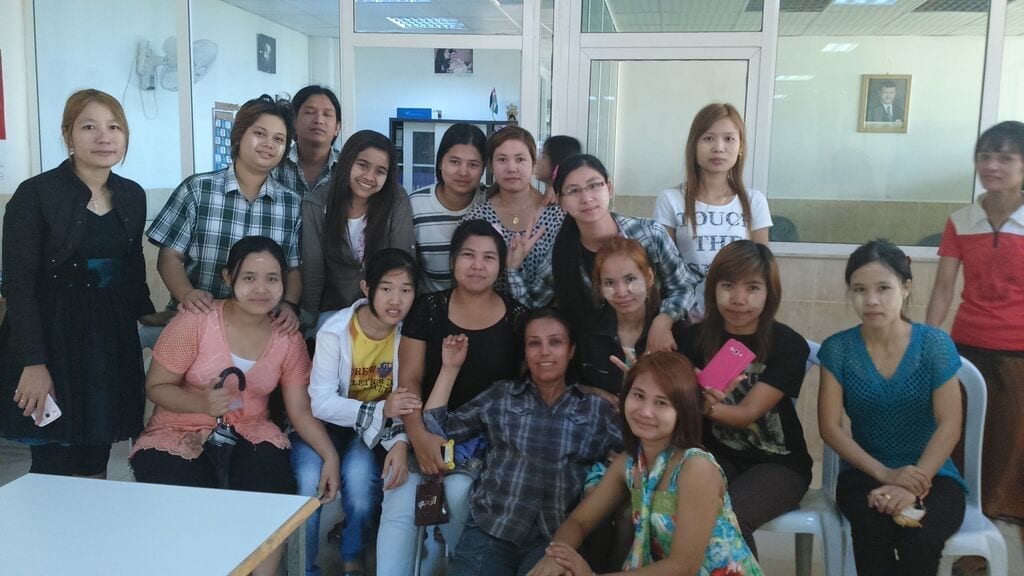
Oct 20, 2015
The “Made in Jordan” label is familiar to U.S. consumers shopping for shirts, jeans and other clothes. Mervat Jumhawi, a Jordanian union organizer, is actively ensuring the largely migrant workforce that cuts and sews these garments does so in safe conditions, receives fair wages and is treated with respect on the job.
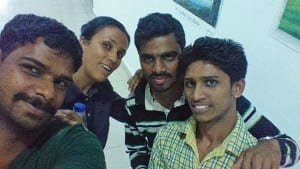
Mervat Jumhawi in a selfie wih Indian textile workers. Photo courtesy Mervat Jumhawi
“I was a garment worker and I know what exploitation is, I knows what that means,” says Jumhawi. After working 13 years in textile factories, Jumhawi spent six years on the board of the General Trade Union of Workers in Textile, Garment and Clothing Industries, where she served until recently. The union represents all 55,000 textile workers throughout Jordan, including migrant workers who comprise 71 percent of the country’s garment factory workforce.
Garment exports, produced primarily for the United States, account for some 20 percent of the country’s gross domestic product, with factories located in the Sahab, Dulail and Ramtha industrial zones.
“In the beginning, I was not familiar with migrant worker issues,” Jumhawi says, speaking through a translator. “But after I worked with migrant workers, I was more interested in their issues because they are more marginalized and vulnerable.”
Migrant Worker Exploitation Begins in the Home Country
Exploitation of migrant workers in Jordan and other countries around the world often begins in their home countries, where they typically pay huge fees to labor brokers for a job. Indebted when they start their employment, migrant workers often endure abusive conditions to pay off their loans. Employers also may confiscate passports, effectively holding migrant workers hostage and unable to leave if they are not paid or if they experience verbal or physical abuse. Jumhawi helps raise workers’ awareness of their rights under the law and assists workers who are not receiving health care, who have been abused or otherwise need assistance making their way through the legal system.
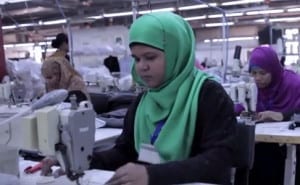
More than 70 percent of migrant textile workers in Jordan are women. Credit: Solidarity Center
More than 70 percent of migrant textile workers in Jordan are women, primarily from Bangladesh, Sri Lanka and Myanmar. Jumhawi’s one-on-one assistance with garment workers and her dedication to improving their working conditions—she spent 40 days and nights with 1,300 striking Burmese garment workers—has generated tremendous trust among the workers.
In one instance, when Bangladesh and Sri Lankan workers went on strike in 2013, Jumhawi tried to speak with managers, but they would not let her in the factory. As she left, she looked back, and saw hundreds of workers following her. Her challenge to management gave the workers strength, she said. Seeing the workers take off with Jumhawi in the lead, managers ultimately negotiated—but not until Jumhawi had talked with each worker to hear specific grievances.
Solidarity Center Support Assists Migrant Workers
The Solidarity Center provided support over the past year for the migrant outreach project among textile workers, holding trainings on combating labor trafficking and exploitation through collective worker action. Workers were encouraged to form committees to monitor labor rights violations and refer them to the union resolution.
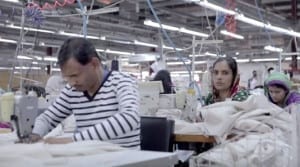
Of the 55,000 textile workers in Jordan, 71 percent are migrant workers. Credit: Solidarity Center
Over the years, the Solidarity Center also has worked closely with the garment workers union, and in May 2013, the union negotiated a contract with employers that covers all textile workers, including migrant workers. The contract set up health and safety committees, requires employer pay for transportation and food and prohibits labor recruiters in origin countries from charging fees to workers.
“Our union is keen on migrant worker issues from the moment they arrive in Jordan,” says Fathalla Al Omrani, garment workers’ union president.
Migrant workers are housed in employer-owned dormitories, which often fail to meet safety and health standards, according to Sara Khatib, a Jordan-based Solidarity Center program office for anti-trafficking initiatives. The contract requires employers follow Ministry of Health standards for living conditions, such as not overcrowding workers in a room.
“We were 10 to 12 women living in one room,” says one garment worker. “After the inspectors visit, the numbers decreased to six or seven.”
‘I Will Struggle for Migrant Workers to the End’
Supervisors yell at the workers if they don’t reach the production target and may deduct pay or even deport them, says Jumhawi. Such actions violate Jordan’s labor laws and the union contract.
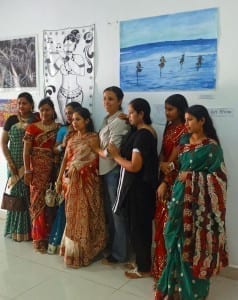
Mervat (center), joins women from Bangladesh, the largest group of migrant workers in Jordan’s textile industry. Photo courtesy Mervat Jumhawi
Jumhawi has been instrumental in helping workers enforce the contract and seek justice under Jordan’s labor laws. She also recently assisted with production of a video documenting migrant workers’ struggles in Jordan and the role of union strength in helping workers achieve their goals. When asked about her most important victories, she says she counts “every single and small achievement,” as a major success, “even helping a worker with a small thing.”
“Mervat is very close to the workers and they all trust her,” says Khatib, who works closely with Jumhawi. “She follows up on the workers’ cases seriously and she deeply cares about them. She’s a hard working woman and a real unionist.”
Jumhawi works 12 hour days, seven days a week, unless she is too tired or sick, she says. Sometimes the long hours and tough demands make her want to leave the job. But she changes her mind when she thinks of the workers.
“I will struggle for migrant workers to the end, and I encourage all workers, especially women, to become unionists. When I became member of the union, I became stronger.”
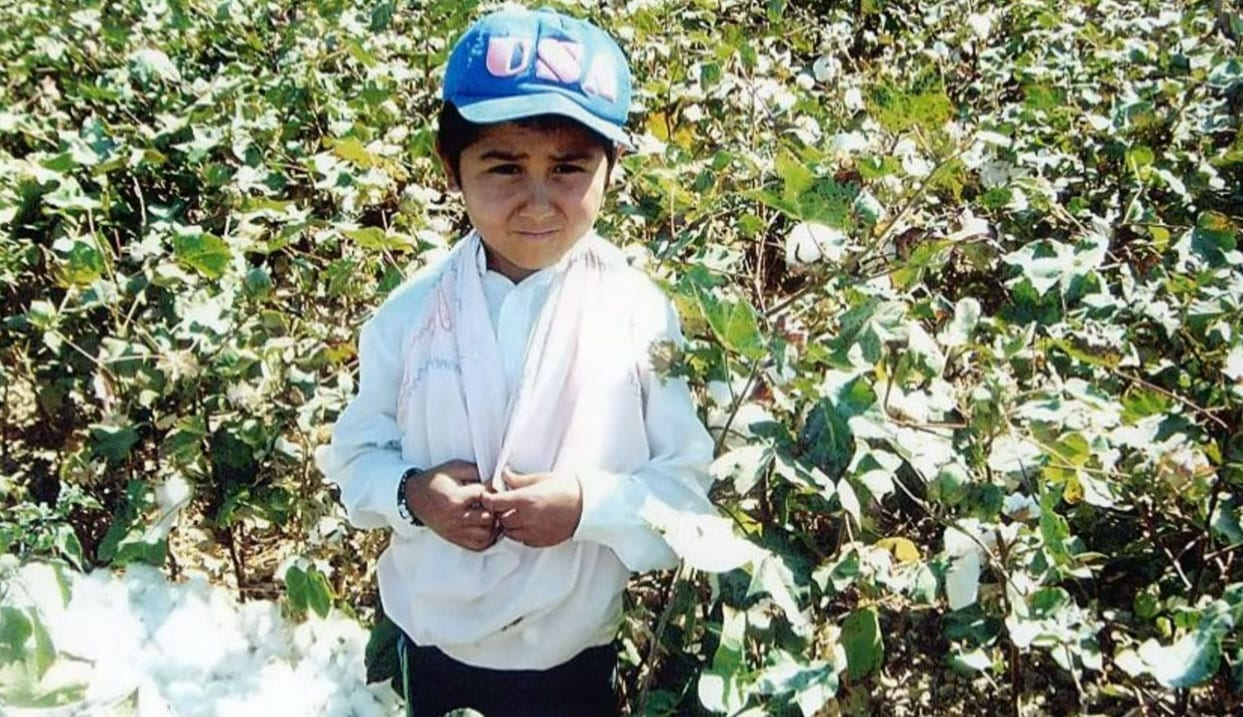
Oct 19, 2015
Six people, including two boys, one age 2, another age 17, died this month in circumstances related to Uzbekistan’s fall harvest, according to the Uzbek-German Forum for Human Rights. Uzbekistan primarily uses forced labor for cotton harvesting in September and October, and last year, at least 17 people died during the harvest season.
The 2-year old boy died while his mother picked cotton under threat of losing her job as a kindergarten teacher. The 17-year old boy and at least three others died when the cargo truck transporting them to the cotton fields rolled over. Yusuf Esirgapov, a medical doctor, died after local officials ordered his arrest and two-day detention as punishment for not fulfilling the cotton harvest quotas assigned to the hospital he directed.
The Uzbek-German Forum, which regularly compiles updates on forced labor in Uzbekistan, also reports that the director of a middle school threatened to fire a pregnant teacher to mobilize her to contribute to the cotton harvest, either by picking cotton or hiring someone to pick cotton instead of her.
Teachers, health care workers and students are among 1 million workers forced to toil long hours in the cotton fields, often without access to clean drinking water and typically work without crucial safety and health gear, exposed to toxic pesticides and dangerous equipment. The state owns most of the land, leases it to the farmers and imposes cotton production quota.
This year, the government of Uzbekistan is expected to make $1 billion in profit from cotton sales, money that disappears into an extra-budgetary fund in the Finance Ministry to which only the highest-level officials have access, according to a 2015 Uzbek-German Forum report.
Uzbek police twice assaulted human rights monitor Elena Urlaeva this year, once in May for documenting forced labor in the cotton fields and again in August for distributing pamphlets explaining laws that prohibit forced labor.
In July, the U.S. State Department boosted the ranking of Uzbekistan in its Trafficking in Persons report, moving it up to the “Tier 2 Watchlist.” The designation means the State Department claims Uzbekistan does not fully comply with the U.S. Trafficking Victims and Protection Act (TVPA) standards but is making significant efforts to become compliant. In its 2014 report, the State Department ranked Uzbekistan as “Tier 3,” the lowest designation that means it does not fully comply with the minimum TVPA standards.
Earlier this year, the Solidarity Center was among 30 global unions, business associations and nonprofit networks urging the U.S. State Department to ensure its Trafficking in Persons report accurately reflect the serious, ongoing and government-sponsored forced labor in Turkmenistan and Uzbekistan.
In August 2015, the Uzbek government committed to “prevent the mobilization of education and medical personnel for the cotton harvest,” at a roundtable with the International Trade Union Confederation, International Organization of Employers, United Nations, embassies and other high-level officials. Last year, the Uzbek government signed loan agreements with the World Bank agreeing to the suspension of finance if there is child or forced labor in the project areas.
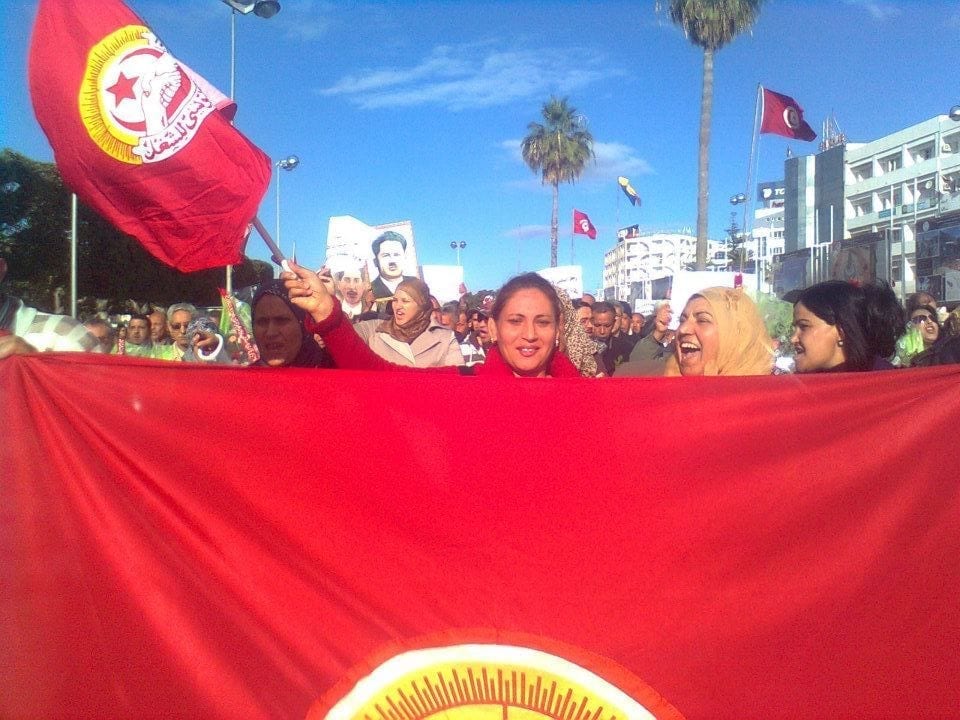
Oct 9, 2015
For its role in brokering a peaceful path to democracy, Tunisia’s labor movement today was named a co-recipient of the Nobel Peace Prize.
The Nobel Committee recognized the Tunisian National Dialogue Quartet—comprised of longtime Solidarity Center ally the Tunisian General Labor Union (UGTT), the Tunisian Confederation of Industry, Trade and Handicrafts, the Tunisian Human Rights League and the Tunisian Order of Lawyers—for establishing “an alternative, peaceful political process at a time when the country was on the brink of civil war.”
The Quartet, formed in 2013, was “instrumental in enabling Tunisia, in the space of a few years, to establish a constitutional system of government guaranteeing fundamental rights for the entire population, irrespective of gender, political conviction or religious belief,” Nobel Committee Chairman Kaci Kullmann Five said at the presentation ceremony.
“This is a great joy and pride for Tunisia, but also a hope for the Arab World,” UGTT chief Houcine Abassi told Reuters. “It’s a message that dialogue can lead us on the right path. This prize is a message for our region to put down arms and sit and talk at the negotiation table.”
In 2012, the UGTT received the AFL-CIO’s 2012 George Meany-Lane Kirkland Human Rights Award along with the labor federation of Bahrain, the General Federation of Bahrain Trade Unions, for their mobilization of thousands of people in their countries to carry forward a message of social justice during the popular uprisings that swept the Middle East in 2010 and 2011.
This is the second year in a row that worker rights activists have been honored with a Nobel Peace Prize. Last year Kailash Satyarthi, head of the Global March against Child Labor, also a Solidarity Center ally, shared the prize with girls’ education activist Malala Yousafzai.
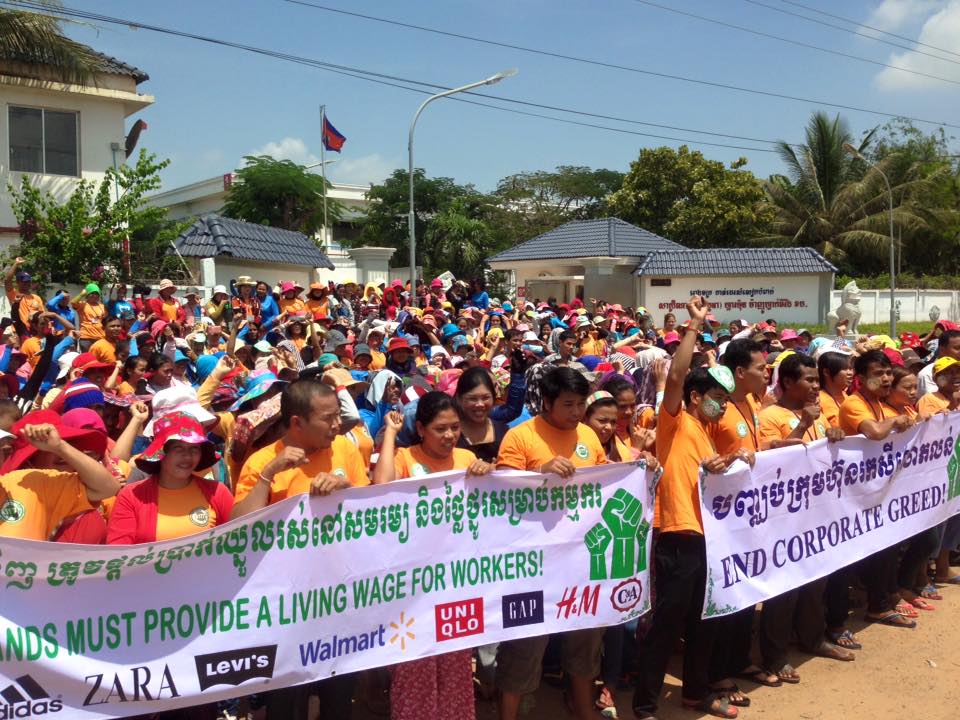
Oct 7, 2015
Some 21,000 garment workers from six unions at more than 60 factories across Cambodia dedicated their 30-minute lunch breaks to rallies calling for a higher minimum wage. The monthly minimum wage for garment and footwear workers is $128. Last year, Cambodia’s garment exports totaled $5.7 billion.
A recent study of garment workers and their expenditures, conducted by labor rights groups, including the Solidarity Center, indicates that the workers currently earn far less than they need to cover expenses.
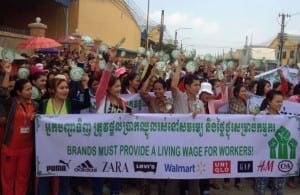
Garment workers from 60 factories around Cambodia devoted their 30-minute lunch breaks to rally on Decent Work Day. Credit: Solidarity Center/Khun Tharo
As part of the October 7 International Decent Work Day demonstrations around the theme, “End Corporate Greed,” workers from industrial areas in Phnom Penh, Sihanoukville, Kompong Spuer, Kandal and Svay Reing provinces held stickers and banners urging international brands to provide a decent living wage for Cambodian garment workers.
A working group of union representatives, employers and government officials has been meeting to determine a new 2016 minimum wage and are nearing a recommendation. The Coalition of Cambodian Apparel Workers Democratic Union (CCADWU) and other unions not affiliated with the government said that they will boycott the process if the recommendation does meet workers’ needs.
Over the past two years, tens of thousands of garment workers have taken to the streets in a series of strikes for minimum wage increases. In January 2014, Cambodian security forces shot into crowds of striking workers, killing at least five, injuring more than 60 and resulting in the arrests and dismissals of dozens of workers and union leaders.
Unions that took part in the Decent Work Day actions include the CCADWU, the Cambodian Alliance of Trade Unions, the Collective Union of Movement of Workers, the National Independent Federation of Textile Unions in Cambodia and Worker Freedom Union Federation.
The actions in Cambodia are part of worldwide activities around the world, with the International Trade Union Confederation reporting events in 33 countries at its World Day for Decent Work site.
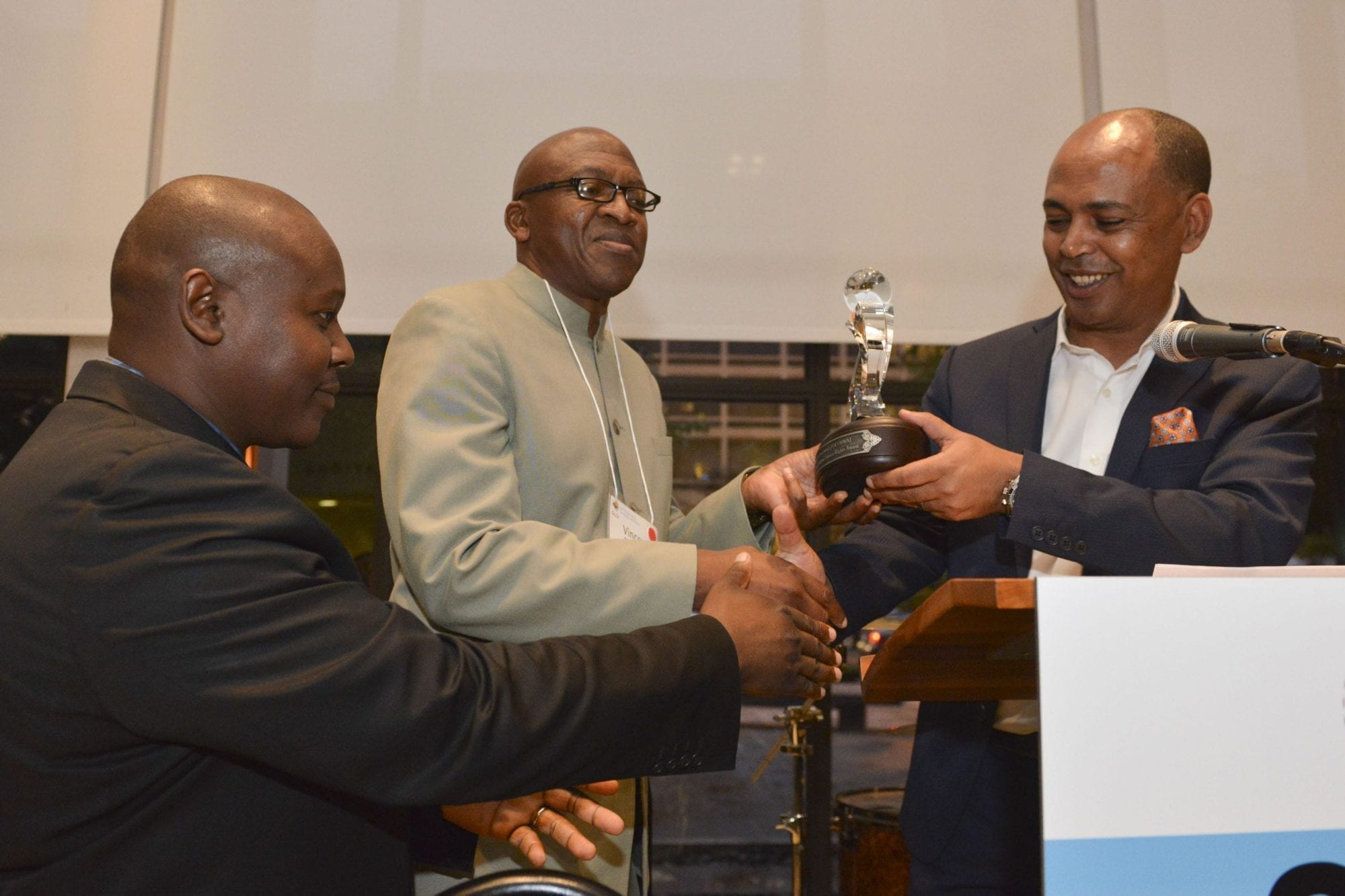
Oct 2, 2015
Over the past year, Swazi workers have not been deterred from taking part in union meetings even though the gatherings were repeatedly broken up by police. They turned out in large numbers for the annual May Day rally, although they were threatened with arrest if they did so. And they took all these actions in an environment in which unions were banned and free speech squelched.
For their bravery in standing up for their rights, Swazi workers and their union, the Trade Union Congress of Swaziland (TUCOSWA), last night received the AFL-CIO’s 2015 George Meany-Lane Kirkland Human Rights Award, which recognized “the courage and persistence of Swaziland’s workers in demanding their rights,” the AFL-CIO said in a statement announcing the award.
More than 200 union allies and supporters, including participants of the Global Labor University conference, packed the AFL-CIO lobby in Washington, D.C., for the honors ceremony, with TUCOSWA Secretary General Vincent Ncongwane and TUCOSWA Treasurer General Patrick Mamba accepting the award on behalf of the union and Swazi workers.
“Labor never quits,” Ncongwane said, accepting the award. “We never give up the fight, no matter how tough the odds, no matter how long it takes,” he said, quoting former AFL-CIO President George Meany.
“You’re truly global leaders for the struggle for justice,” said AFL-CIO Executive Vice President Tefere Gebre as he presented the award.
Speaking at the event, Jos Williams, president of the AFL-CIO Metropolitan Washington Labor Council, described his experience as part an International Trade Union Confederation (ITUC) fact-finding delegation to Swaziland in May. Members of the delegation were moved to tears during their meeting with families of imprisoned human rights leaders, Williams said.
“I saw tough freedom fighters with tears in their eyes once they heard from their families.”
TUCOSWA was formed in 2012 with the merger of the Swaziland Federation of Trade Unions and the Swaziland Federation of Labor. Both were joined by the Swaziland National Association of Teachers. TUCOSWA only received official recognition this past May, after the U.S. government suspended trade benefits with the country last year and made worker rights a key component of restoring its trade eligibility.
Since the U.S. government suspended Swaziland’s participation in the African Growth and Opportunity Act (AGOA), the country also has freed imprisoned human rights advocates but it has not yet repealed anti-terrorism laws that enable it to imprison union leaders and others who call for human rights and democracy.
At a briefing on working conditions in Swaziland at the Solidarity Center, Ncongwane noted that the loss of trade benefits has impacted thousands of workers, especially in the textile sector, who have been laid off.
Speaking last night, Ncongwane said “we are working tirelessly to press for reforms that will put our country on a more secure footing to restore these jobs and to restore job opportunities. The greatest threat to jobs and growth in Swaziland does not come from unions, but from our government’s lack of foresight, lack of vision and mismanaged policy decisions.”
Ncongwane emphasized the positive impact of global labor solidarity which, in publicizing the government’s actions, has enabled the union to operate with some measure of freedom.
“We will utilize our institutional strength to impact and press for change but we need our international partners in the global labor movement to maintain support for workers’ rights and for greater democracy in Swaziland, especially now when we are as close as we’ve ever been to real reform in years,” he said.
The annual Meany-Kirkland award, created in 1980 and named for the first two presidents of the AFL-CIO, recognizes outstanding examples of the international struggle for human rights through trade unions.
Last year, the Building and Wood Workers’ International (BWI) and its affiliates received the award and the International Domestic Workers Federation (IDWF) received it in 2013. In 2012, the award went to the Tunisian General Union of Labor (UGTT) and the General Federation of Bahrain Trade Unions (GBFTU)—two unions whose struggles were emblematic of labor’s role in the uprisings that year.










